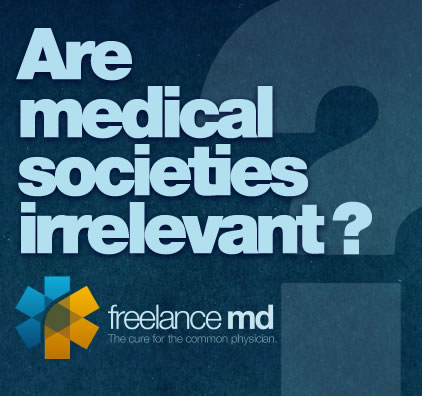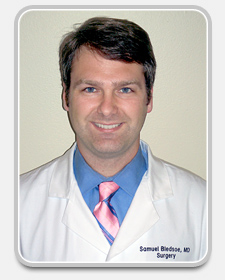
By Greg Bledsoe MD
Ask yourself this question: "Why am I in my medical society?"
A few years ago I took the plunge and stopped hoping to become an entrepreneur and actually stepped out and gave it a whirl. It was a crazy time.
I learned very quickly that starting a business always takes a lot more time and money than you originally envision, and in short order I was scrounging for capital to fuel my dream.
It was during this time that I made a decision to let my medical society memberships lapse. I had never considered it before, really, and as far as I was concerned, being a part of medical societies was simply part of being a physician-- I paid my dues and they supplied my, er, membership.
When I was in academics, my department paid my society dues as part of my contract. I never thought about the cost since I didn't view the funds as coming from me (there seems to be a moral here somewhere...), but when I entered the world of community, or non-academic, medicine, suddenly the costs associated with these memberships became very real.
Five hundred dollars for this membership. Three hundred a year for that one. It quickly added up, but I got a special tuition discount if I attended the annual meeting and I even got an occasional journal delivered to my mailbox with my name stamped on the front. It all seemed very official and made me sort of feel like part of a special group, so I dutifully paid the dues and congratulated myself on my support of the furthering of the intellectual aims of XX society.
However, as anyone who's ever been in business can tell you, at some point tough decisions have to be made, and for me, the relinquishing of my membership in these societies was one of those tough ones. I believed in these organizations. I liked being associated with them. I enjoyed seeing my name stamped on the front of the journals and I even flipped through an article or two when I could. Walking away from something that made me feel so "involved" made me feel isolated, vulnerable. If being a member of these organizations made me feel included, leaving them made me feel...alone.
That was almost three years ago.
Since then, the various ventures with which I'm involved have finally started to right themselves and for the first time in quite a while I have begun to have the ability to get involved once again in medical societies. In the past few months I've begun to ponder joining this society or that one, trying to figure out which one would be a better fit and from whose membership I would learn the most skills-- and meet the most talented leaders.
After marching down this path for a little bit, I finally stopped and asked myself a very simple question: why?
Why was I considering membership in a medical society?
It's true that when you begin a company your mind becomes much more keenly aware of the theoretical "return on investment" (ROI) than before. I began asking myself the typical ROI questions I had asked myself at the beginning of any of my entrepreneurial ventures: What would I gain from the investment of time and money in this organization? Would my funds be better directed elsewhere? Could I gain the same benefits without investing the relatively high annual dues? How would I verify that my funds would be used appropriately and at what point would I be able to have an impact in the overall mission of this organization?
My honest assessment after a sit down talk with myself and a review of the available information before me was the following: For the most part, medical societies do not offer a significant enough ROI to warrant the investment required to participate.
I know this sounds like heresy for some, but let's review the facts...
From what I can tell, the reasons given for a physician to be a member of any medical society today basically revolve around three points.
First, societies are said to offer camaraderie and networking opportunities for their members. Second, societies supposedly help promote medical education and proper practice standards among their participants. Third, medical societies, through the old "strength in numbers" adage, are in theory better able to represent their members politically and promote and pass legislation that furthers good medical practice.
Let's review these arguments in broad daylight and see if they hold water.
A generation ago, being a member of a medical society was really the only way a physician could connect with other physicians outside their basic social circle. You joined the medical society of X in order to associate with its members, get invited to its galas, hear the latest research, and hopefully move up the ladder of influence of said organization as you progressed in notoriety and seniority. This model was the same model used in the business world with the Elks Club, Rotary International, and the corporate culture at large. Young, idealistic individuals, regardless of their skill set or motivation, waited in line patiently for their name to be called and an opportunity given to begin climbing the rungs of leadership within an organization, whether this organization was the Elks, IBM, or the X Medical Association. One didn't even consider leaving if you had any career ambitions or longing for social connectedness. The arrangement was what it was, and you just had to adjust.
This model worked for quite a while since it was easy for senior members to control the benefits of membership, and parcel these benefits out only to those junior members who walked the line.
In the corporate world, the personal computer revolution and especially the internet explosion, completely imploded this hierarchal regime. No longer could senior corporate members exclusively hold the benefits of membership. Enterprising upstarts could easily, from the comfort of home, begin a company on the web and not only leapfrog their old positions, in some cases they leapfrogged their entire industries. The recent movie The Social Network , while criticized for not being 100% accurate, at least tells the gist of the story-- that a couple of Harvard undergrads turned the world on its ear from their dorm room.
The internet has become the great world flattener, and while Richard Florida is correct that innovation still occurs in geographic regions, the ability to take your idea to the world in an instant is a tremendous power that prior generations did not have. Furthermore, with the internet and more specifically, the social networking ability on the internet, junior members in every organization can instantly, and freely, associate themselves with whomever they choose all around the world. Gone are the days when being on the outs with your local or even national medical society is a professional death sentence. Individuals now have the ability to join any number of interesting networking groups, or even start their own.
Along this same line of thinking, the days when medical societies controlled medical education are long gone. With the click of a keyboard, I can find medical education on almost any topic and I can access it at any time. I don't have to wait for my professional journal to arrive, and anything cutting edge will be posted on the web long before it hits my mailbox anyway.
When I pay my fees to earn CME credits, I now have the opportunity to choose what topics I hear, and whom I hear teach them. No more sitting in a conference lecture listening to the droning of Dr. Oldenkrinkle simply because he's the chair of the education committee. I can learn from the best teachers at any time in the comfort of my home and earn my CME credits on my own terms.
So with regards to the power of networking and the educational opportunities available, I would have to say that there are as many, or more, opportunities outside of medical societies today as there are within. And when you consider that most of the membership societies available to the modern physician are free, why would you pay $300-$500 to be a member of a medical society for the networking or educational reasons? It just doesn't make sense.
The last reason-- pooling our strength to become a stronger political lobbying force for X issues or specialty-- is the one most often cited in the recent past by modern physicians as a reason to be involved in a medical society. Matter of fact, this one reason was a big one for me. I mean, any objective person can see that physicians need a strong lobbying voice in Washington, if for no other reason than simply to attempt to counterbalance the influences of the trial lawyers and their ilk.
However, I describe this as being cited in the "recent past" because I haven't heard it from any physician recently.
No, if there was one glorious revelation that came into full view during the healthcare debate in this country, it was the cowardice of the self-serving leadership at the helms of most medical societies in this country.
I don't think any physician will be fooled in the future with the "give us your money and we'll stand up for you" line that motivated us in the past. What the healthcare debate clearly revealed was that when medical societies say they work for their constituents, they do truly mean this. It's just that their constituents aren't the dues-paying members that constitute their ranks-- they're the entrenched bureaucrats in their leadership.
Physicians watched in horror as medical society after medical society lined up and endorsed Obamacare, and then spoke to America as if their members were in agreement. The American Medical Association was the worst offender, selling its soul to keep intact its lucrative, exclusive right to the CPT billing codes that fund its bureaucracy. It was appalling in its transparency, and no physician who saw it will ever forget it.
So what to do as a modern physician?
The point here isn't to argue that no medical society is worth joining. Many societies do good work in certain areas and there are physicians who derive a great deal of pleasure from membership in a society or two of interest.
My point in this post is that being a member of a medical society is simply not the knee-jerk necessity it was a few years ago, and there's no credible reason to join any society unless you really feel that their mission meshes with yours and you want to be involved.
More importantly, I believe that medical societies need to begin asking themselves what real value they give their members. Today's young physician will not be coerced in the traditional way into membership, and if value isn't apparent, many will simply walk away.
So will I eventually join a medical society?
I don't know.
Maybe.
I'll need to discuss it with my friends on Facebook and get back to you.
Greg Bledsoe MD MPH is a Board Certified Emergency Medicine physician and the founder and CEO of ExpedMed and the Medical Fusion Conference. He blogs at Freelance MD.
Submit a guest post and be heard.
 There's no doubt about it. Typing your name (or your clinics name) into Google or Yahoo and seeing what pops up is something that the majority of your patients are now doing. So, we ask the question, is it fair to do the same?
There's no doubt about it. Typing your name (or your clinics name) into Google or Yahoo and seeing what pops up is something that the majority of your patients are now doing. So, we ask the question, is it fair to do the same?


















